

|
Grandpa Taom's Sea Tibu ae Taom i Taari. |
|
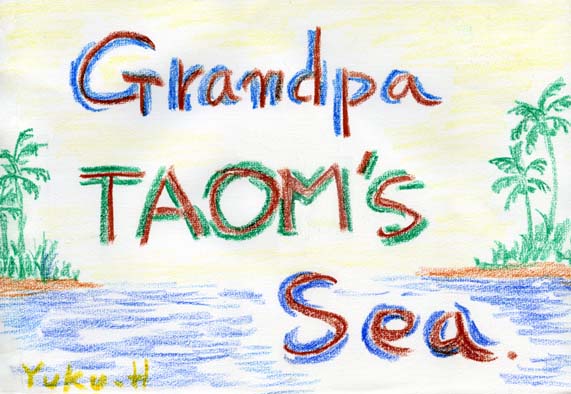 |
|
| 1. When Grandpa Taom was young, he was famous as the best fisherman in the village. They say that he caught by himself a lot of huge fish which were several meters. But, he had to be quit fishing since he was injured accidentally in the sea twenty years ago. One day his grandson Piita came to Taom's house and asked him some questions. Ngke te ataei ni mwane tibu ae Taom, ao e bon rangi ataaki ba te tia akawa ngaia ae akea n ai arona n ana kawa. A taekinna aomata ba e akakawa n ti ngaia ao e kona ni katokai ika aika bububura ae tao kaka tabeua te miita abakiia. Ma e a toki naba akawana ngke e a ti kabuanibai naba ni ikoaki i taari tao 20 te ririki n nako. Ao n te bongi teuana, e a roko tibuna te mwame ae Piita ni kawaria n ana auti n titirakina bwai tabeua. |
|
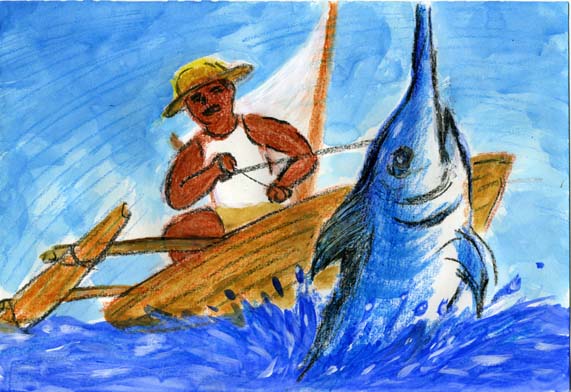 |
|
| 2. Piita: "Grandpa Taom, is it true that you were a master of fishing?" Taom: "What Piita ? I don't think I was a master myself, but I know more about fish rather than other people." Piita: "Then, please teach me why I can not catch fish recently." Taom: "Piita, you can not catch fish? Perhaps your way of throwing nets was wrong." Piita: "Tibu ae Taom, e koaua ae bon mwatitan te akawa ngkoa ngkoe?" Taom: "Tera Piita? I aki ataia ae mwatitan te akawa ngkoa ngai ma I ata riki taekaia ika nakon taekaia aomata." Piita: "Ao ngkanne, taiaoka n reireiai ba tera bukin ae akekea konau te ika n taai aikai." Taom: "Piita, akekea konam te ika? E aki ngkoa ao e bure kabakaan am karaun." |
|
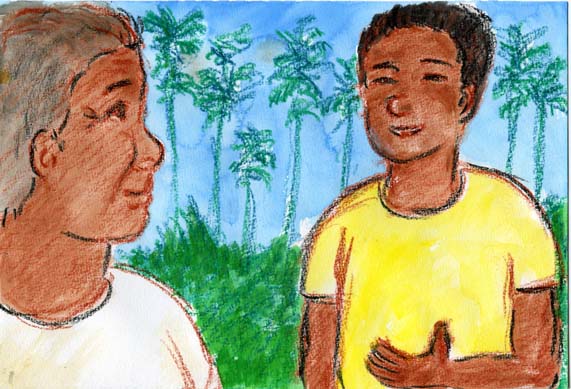 |
|
| 3. Piita: "Taom, No, I'm proud of throwing nets, and everybody says that I'm good at it." Taom: "Then, your eyes are weak." Piita: "No, I can see as far as ten kilometers ahead, even the letters on flags." Taom: "So, the fishing place may be bad." Piita: "No, even in that place you caught many fish, there is no fish." Taom: "No fish? There is no fish in that place of the sea these days ?" Piita: "Taom, tiaki ngaia anne, ba I kukukurei ngkana I kabwaka au karaun ao a taku aomata ba e raoiroi kabwakaan au karaun." Taom: "Ao ngkanne, ...tao e aki raoiroi am taratara." Piita: "Tiaki naba nagaia anne, ba I kona nora te raroa ae tao 10 te kiromiita ao te koroboki n te buraeki." Taom: "Ao tao e buakaka am tabo n akawa." Piita: "Tiaki naba anne, ba ngkoe ngkoa, e babati konam n te tabo arei;...e aki ngkoa ao ai bon akea te ika." Taom: "Akea te ika? Akea te ika n te tabo anne n taai aikai?" |
|
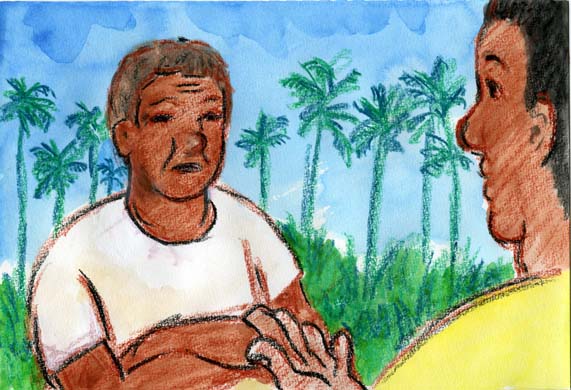 |
|
| 4. Piita: "Yes, please teach me why fish were gone from there." Taom: "Piita, I can't believe there is no fish in that place nowadays." Grandpa Taom was very surprised to listen to his story. Even if he could not catch any fish in other place, he could catch too many fish in that place of the sea. He wondered what was the happening there last 20 years. Piita: "Eng, ao taiaoka n tuangai ba tera bukin ae a kitana te tabo arei ika." Taom: "Piita, I aki kona ni kakoaua ae akea ika n te tabo anne n taai aikai." E bon rangi ni mimi Taom n ongora n ana karaki tibuna are Piita. Ngkoa e kona n aki reke konana n taabo riki tabeua ma e a bon tiitira naba konana n te tabo n akawa arei. E a iangoia inanona ba ai tera ae a riki naba nakon te tabo anne inanon 20 te ririki n nako. |
|
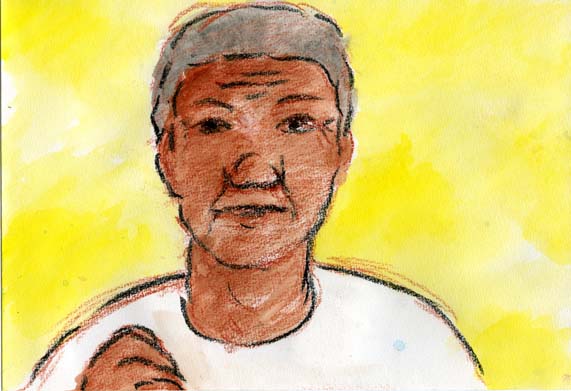 |
|
| 5. Piita: "Grandpa! Not only in that place of the sea, but also around this island, why the number of fish have become less ?" Taom: "Piita, then, let's go to the sea and see that place!" Grandpa Taom could not help seeing that place by himself. Piita: "Grandpa, are you sure? I think you will never go to the sea." Taom: "Yes, I'm going there after twenty years' absence..." Grandpa Taom was recalling the catching fish in his younger age. Piita: "Tibu! tiaki ti n te tabo n akawa arei, ma ni katobibia naba te aba, e aera ngkai ea kekerikaki mwaitin te ika ngkai?" Taom: "Piita, nakomai ba ti a nako n noora te tabo n akawa anne." E a aki kona nako Taom n nora te tabo n akawa arei n ti ngaia. Piita: "Tibu, ko bon koaua ae ti na nako? I taku ngai ba ko nang aki kona ni mwanga okira taari." Taom: "Eng, ao okiu aei ai tiba au moan tai imwin kitanan te tabo anne 20 te ririki n nako....." Ao Taom e a kataia ni ururing akawana ao konana aika bati ngke te tei ni mwane ngaia. |
|
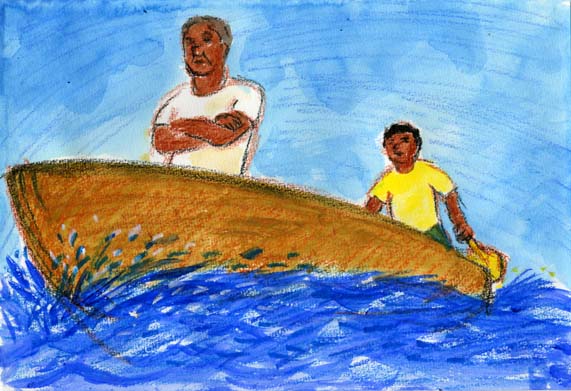 |
|
| 6. Next day, Grandpa went to that place of the sea by Piita's boat. Taom: "When I was young, boats were moved by wind, so I'm not good at the motor engine." Piita: "You know, the boat with the motor engine is faster." Taom: "Yes, but we can't listen to the sound of the wave by the motor engine noise, cannot watch the sea well. If we were on a boat by wind, we can look at the bottom of the sea well." Ao n te bong are imwina, ao Taom e a tokara ana booti tibuna are Piita ni kaea te tabo n akawa.arei. Taom: "Ngke I uarereke ao booti a ieie, ngaia are I babanga ni kabuta te booti ae iai intinna." Piita: "Ko ataia, e butimwaka riki te booti ae iai intinna." Taom: "Eng, ma ti a bon aki kona n ongo rebwen bwaron nao n rurungaan te intin ao n nora raoi naba taari. Ngke ti ieie, ao ti kona n noora raoi te rakai ma atibu ake i nano." |
|
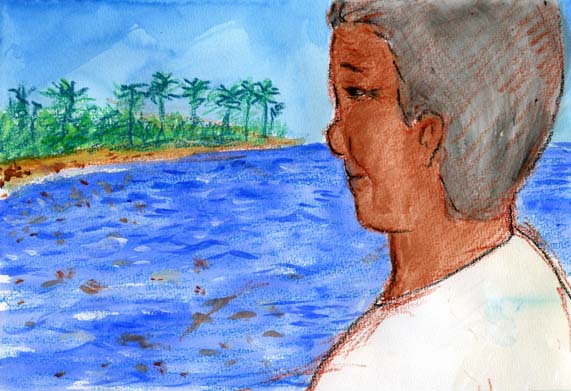 |
|
| 7. When they got to the spot in the sea, they stopped the engine and left the boat to waves. Piita: "Grandpa, here we have the spot." Grandpa saw the water surface, the seashore, the beach and the forest. Then he gave a sigh. Taom: "What a good old scene of the color of the sky, the shoreline and the rock of sign. But, I notice the oil floating on the sea! There are many plastic bags on the seashore, cans dumped on the beach and the forest has become so small. I didn't know the sea which used to be so beautiful had became such dirty and worse." Grandpa was shocked at the sea around him. Ngke a roko n te tabo arei ao a tiringa aia intin ao kakabeibeti nako. Piita: "Tibu, ao aei ngkai te tabo n akawa arei." Ao tibuna are Taom e a tara aon taari ao e nora tokin taari ao aon te bike ma te buakonikai ao imwina e bwaebwaeti inanona. Taom: "Ai bon tamaroara ngkoa taran karan karawa, aon te oora ma atibu n te tabo aei....Ao ngkai I a nora te oera ni beibeti iaon tari ! E a mwaiti te buraetiki iaon te ora, tiin ni moi a karenakoaki iaon te bike ao e nang mauna nako te buakonikai. I aki ataia n taai akekei ae te tabo ae moan te tamaroa aei e na rangi ni mangeange ma n buretireti ngkai." E bon rangi ni tounako tibuna are Taom ngke nora tari are irarikina n aekana arei. |
|
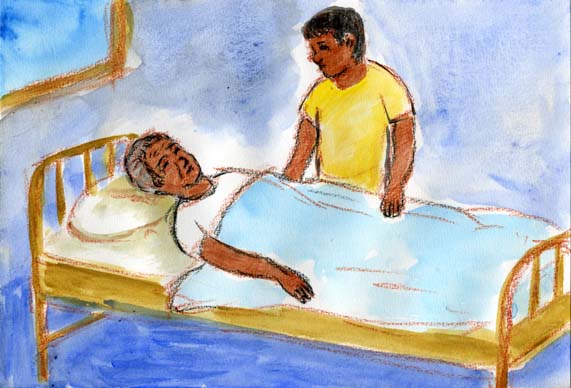 |
|
| 8. Since Grandpa got sick in bed to be shocked to see the sea and seashore, Piita felt sad. Because just after Piita took Grandpa to the sea, Taom became sick. He felt sorry about it. And he cried every night on the beach. Imwin noran buretiretin taari ao aon te oora, ao e a taonaki Taom n te aoraki ao ai te wewenewene naba irouna. E taonaki Piita n te nanokawaki ngke e reke aei nakon tibuna ba n ana koaua, ao e aoraki tibuna bon mwin ae kairia nako taari. Ao n tokina, ai bon te tang irouna ni katoa tairiki iaon te bike. |
|
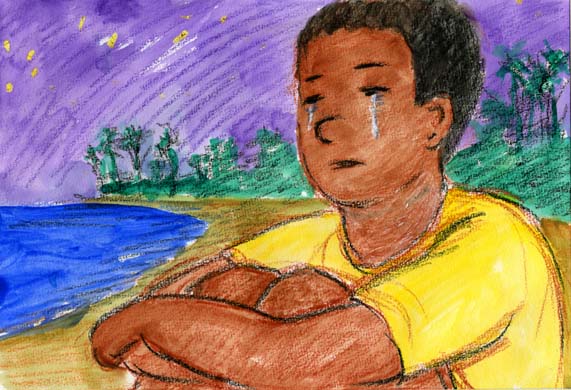 |
|
| 9. The night as well, Piita came the beach without sleep. Moonlight was waving on the dark sea, and a tear rolled down his cheek. Piita: "How can I get my Grandpa better? God, please tell me. I will do everything what I can. God, please tell me how I can help him." Piita knelt down on the beach in tears. Then... Ni katoa tairiki, ao Piita e aki mamatu ao ai te nanako n tang iaon te bike. Bon tain te maama ae korakora taai akanne ao ko kona nora raneanean otan namakaina ibuakon te roo tongitong ao waanakon ranin matan Taom iaon tabana. Piita: "N na kanga ni buoka katokan aorakin tibu? Te Atua. I a butiko tuangai arou ae N na karaoi baai ni kabane ake I kona ni kabebetea aorakin tibu. Atuau, taiaoka tuangai arou ba I aonga ni buoka aorakin tibu." Ao imwina e a katorobubua Piita n tang iaon te bike. Ao ngkanne..... |
|
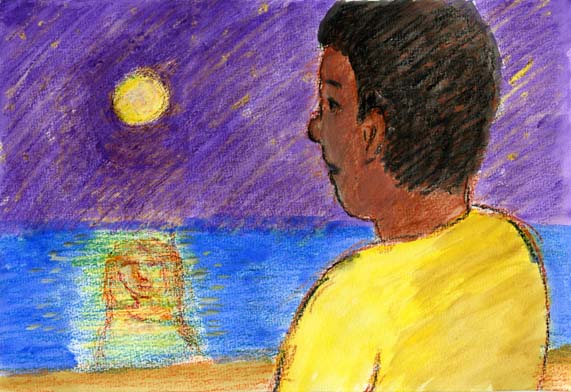 |
|
| 10. The moonlight on the water became the shape of human, and finally became a goddess! Goddess: " Piita, you are very kind to your Grandpa. So I tell you. If the sea become as beautiful as before, he will get better." Piita: "What? If the sea become beautiful as it was?" Goddess: "Yes, Piita, your Grandpa and the sea are the same resources originally. The sea's pain is the same pain as he has. You can recover the sea beautiful as it was." Then the goddess changed into the moonlight again. Ao akea ba e a riki ba tein te aomata otan namakaina are iaon taari ao n tokina, ea riki ba te Atua ae te Aine! Te Atua n aine: "Piita, ko bon rangi n akoi nakon tibum. Ao N na tuangko, e na toki aorakin tibum ti ngkana e kona ni manga okira aron tamaroan taari ikai are rimoa." Piita: "Tera ae ko taku? E na marurung tibu ngkana e okira tamaroana taari ikai are rimoa?" Te Atua n Aine: "Eng, ngaia anne, Piita. Tibum ao taari bon titebo ba kaubwai aika a bongana ngke a moan karikaki. Marakin taari bon ti tebo naba ma marakin tibum. Ko kona ni kaoka tamaroan taari are rimoa." Ao imwina, e a mauna nako te Aine arei ao e a manga riki ba otan namakaina ke te maama. |
|
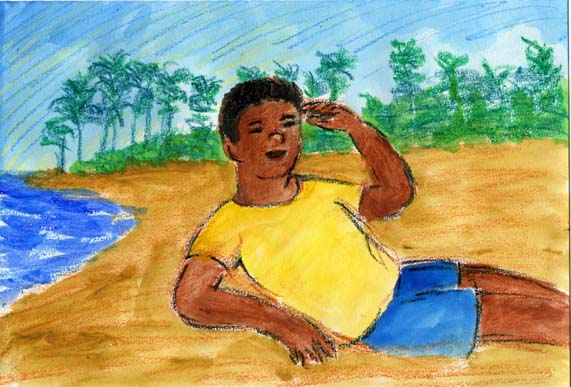 |
|
| 11. Until Piita awoke, he had slept on the beach. But, he thought the goddess's message of last night was not a dream. And he remembered his Grandpa's word, "I didn't know the sea which used to be so beautiful had made such dirty..." Piita said and began to run as if he got some idea. Akea ba e a uti Piita ao n ana iango e taku ba ana rongorongo te Aine arei bon tiaki kanoan te mii. Ao e a uringa ana taeka tibuna, "I aki kaman ataia ae tari ae moan te tamaroa ngkoa, e na kona n rangi ni buretireti man mangeange." Imwin taekinan anne iroun Piita, ao e a biri ba aongkoa a reke ana iango tabeua. |
|
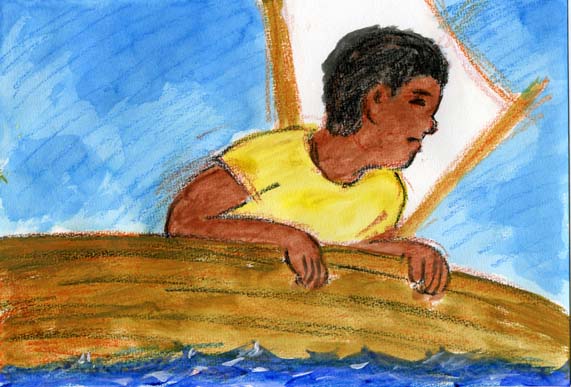 |
|
| 12. Piita came to the same place of the sea. He was on the boat by wind and listened to the voice of the sea, watched the sea as his Grandpa said. He could look at the bottom of the sea which he usually overlooked. Piita: "I didn't know so many empty cans are here." As his Grandpa said, he found garbage all around the sea and the beach. Piita examined the kinds of garbage. E a manga okira te tabo n akawa arei Piita, tiaki n ana booti are iai intinna ma ai te booti ae ieie. Inanon okina anne, ao e karaua ni kakauongo rurungaan taari ao n taratara aon taari n aron ana taeka tibuna nakoina mai imwaina. Ngkoa ao e bon aki kakatabea nanona n taratara taari Piita ma n te tai aei, ao e a karaua ni mamataku n taari ma taian atibu ake i nano. Piita: "I aki kaman ataia mai mwaina ae rangi ni maiti tiin ni mooi ae akea kanoaia n te tabo aei." E a kakoaua ana taeka tibuna nakoina mai mwaina ngke e a kunea ae maiti te mange i taari ao iaon te te bike naba. Ao imwina ao Piita, e a karaua n noria ba te aekakira aekan mÕange akekei. |
|
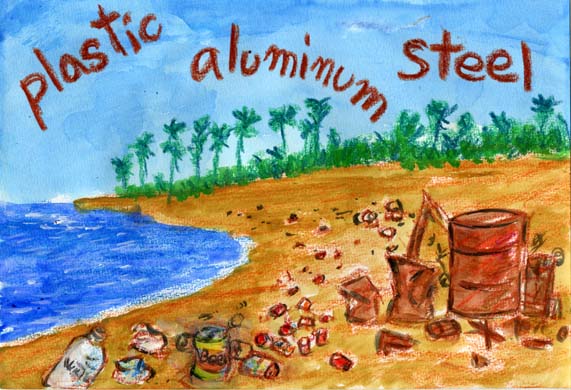 |
|
| 13. Piita: "What is the most of garbage things you can see what can not be burnt?" (Questions for the children; What do you think?) Piita: "Steel scraps." Piita: "What is the next much of them?" (Questions for the children; What do you think?) Piita: "Empty cans." Piita: "What is the third of them?" (Questions for the children; What do you think?) Piita: "Plastics." Piita: "Tera te m'ange ae kanganga kabuekana ao ae rangi ni maiti?" ( Te titiraki nakoia ataei: Tera ami kaeka?) Piita: "Te makoro ni biti." Piita: "Tera te m'ange imwina ae rangi ni bati naba?" ( Te tititaki nakoia ataei: Tera ami iango?) Piita: "Tiin ni moi kamanging ao karewerewe ake akea kanoaia." Piita: "Tera te ka-tenua ni m'ange ae rangi ni mwaiti naba ikai?" ( Te titiraki nakoia ataei: Tera am iango?) Piita: "Te buraetitiki." (plastics) |
|
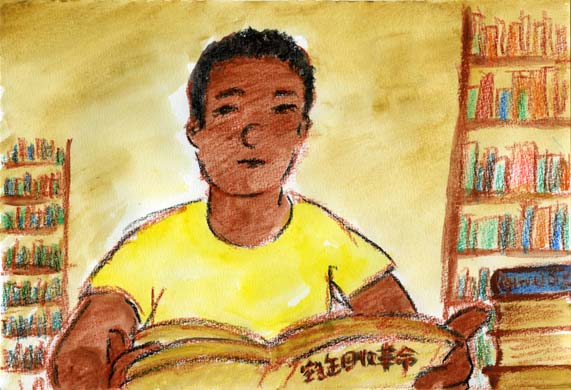 |
|
| 14. Then Piita went to the library and surveyed the garbage. Piita: "I think it is good idea that I do collect the garbage by type. But I have no idea about what can I do for them next. I'm sure here is some idea in the library." Piita read the books about garbage at random. Piita: "Well, the garbage will be resources if we do collect them! That is called recycling system. We have limited resources on the world. If we use them too much, some islands will be under the sea level by the Earth warming! No way! Wait! It is interesting if we collect the garbage by type, it will be earned some money! I didn't know the recycling makes money. Then, what kind of garbage is most valuable?" (Questions for the children; What do you think?) Imwina ao e a nakon te Tabo ni Boki Piita ike e a karaua ni kakaea raoi te taeka ae te m'ange. Piita: "I taku ba te iango ae raoiroi ngkana I kakaokoroi au m'ange n aekaia nako ngkana I rikorikoi. Ma I aki ataia ba tera ae N na karaoia ma au mwange akanne imwina. N au koaua ao e na reke au iango iaon aei n te Tabo ni Boki." Imwina ao Piita e a wareki booki n taekan te m'ange; n aron are a kona n reke irouna n te Tabo ni Boki. Piita: "Te m'ange bon te bai ae manena ke te kaubai teuana ngkana ti rikorikoi ao ni manga kabonganai. E aranaki anne ba kaokiokan kabonganaan te te m'ange. N te aonnaba aei, ao a karako kaubwaira. Ngkana arona ba ti rangi ni kakabonganai kaubwaira, ao tabeua aba a na bua ni kekeraken rietan taari are riki man rikiraken kabuebuen te aonnaba! Tiaki ngaia! Taninga! E rangi ni kakaongora ngkana ti kona ni kakaokoroi m'angera ake ti rikorikoi, ba e kona n reke ara mwane iai teutana! I aki ataia ae kona n reke te mwane man kaokiokan kabonganaan te m'ange. Ao tera ngkanne aekan te m'ange ae te kabanea ni bongana?" ( Te titiraki nakoia ataei: Tera am iango?) |
|
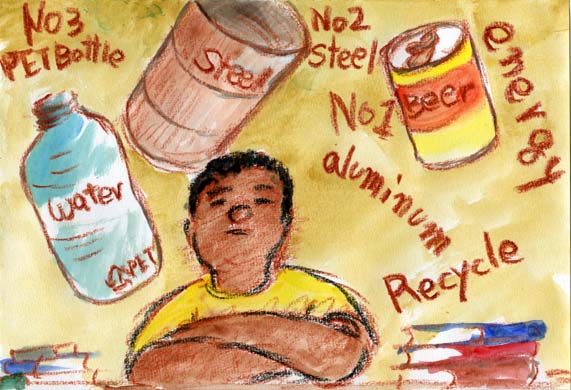 |
|
| 15. Piita: "Oh, they are aluminum cans. For example, the cans of juice and beer. Huh, it uses much energy to make new cans from the aluminum sheet itself. But if we recycle old cans to new cans, the energy is more little. Thirty recycled cans are made by the energy of one original aluminum can. So the aluminum cans are high price. What kind of garbage is the next higher? (Questions for the children; What do you think?) Huh, it is steel something like steel cans and steel scraps. They are recycled in many countries, so the prices are good. What is the third higher? (Questions for the children; What do you think?) PET bottles. They are melted and reproduced to bottles, clothes and shoes." Piita: "Oh! tiin aramanim (aluminium) n aiaron tiin ni moi karewerewe ao kamanging ke biia ake a bane kanoaia. Hub! E bati te iti ae kabonganaaki ngkana a karaoki tiin aika boou man teb'ana te aramanim. Ma ngkana ti kakaraoi tiin aika bou man tiin aika a tia ni kabonganaaki, ao e na uarereke te iti are na kamanenaaki. Te katoto teuana ba te iti are ko kamanenaaki ni karaoan 30 tiin aika bou man tiin aika a tia ni kabonganaaki bon titebo ma maitin te iti are e na kamanenaaki ni karaoan ti teuana te tiin ae bou man te aramanim ae bou. Ma ngaia are tiin ke kaen aramanim a kakawaki ba a kona ni kaboaki nako ba iai booia. Tera te m'ange imwina ae kakawaki naba? (Te titiraki ibukia ataei; Tera ami kaeka?) AA.... Makoro ni biti ke tiin ake a karaoaki man te biti ke te biti rabataia. Tiin ao makoro ni biti aikai a kona ni manga kabonganaaki ao a raraoi booia ngkana a kaboaki nako. Tera are imwina? ( Te titiraki nakoia ataei; Tera ami kaeka?) Batoro n ran ao moi karewerewe ake a karaoaki man te buraetitiki. Ngkana a manga kaburoaki batoro aikai ao ngkana a ran ao e kona ni karaoaki mai iai batoro, kunnikai ao kau-ni-wae." |
|
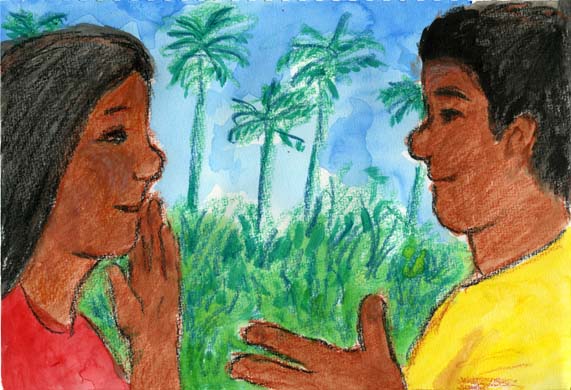 |
|
| 16. Soon Piita talked to his friends about that. Piita's old friend Meere laughed and said. Meere: "Piita, I can't believe that garbage can be sold!" Piita: "Meere, it's true. Look at this book." Meere: "But this is the story happens in far countries." Piita: "No, the problems of garbage are same around the world. If you throw away them, they will be garbage, but if you collect, they will be resources of the material. And the problem is not money but my Grandpa's life!" Meere: "His life?" Piita: "To make the sea beautiful as before is my resolution for him." Meere nodded seriously. Meere: "Piita, will you do this alone?" Piita : "Meere, let's work out together!" E aki maan imwina ao e a maroro Piita ma raona are Meere ao e ngare Meere ao e taku. Meere: "Piita, I bon aki kona ni kakoaua ae kona ni kaboaki nako te m'ange." Piita: "Meere, bon te koaua ae I tuangko. Nora te boki aei." Meere: "Ma te karaki ae taekinaki a bon riki n aba aika raroa nako." Piita: "Tiaki, te kanganga ma te m'ange bon ti tebo n taabo nako n te aonnaaba. Ngkana arona ba ko karenakoa te m'ange, ao e na bon tiku te m'ange ba te m'ange n akea riki, ma ngkana ko rikorikoi ao a na riki ba baai aika a bongana ma ni manena. Ao te kanganga tiaki te mwane ma bon maiun tibu ae Taom." Meere: "Maiun tibum?" Piita: "Manga katamaroan taari nakon itiakina are rimoa bon nagaia teuana angan buokan marurungin tibu." E katoutoua atuna Meere ao e taku; Meere: "Piita, ko na karaoa anne n ti ngkoe?" Piita: "Meere, ti a uaia ni makuri iaon aei." |
|
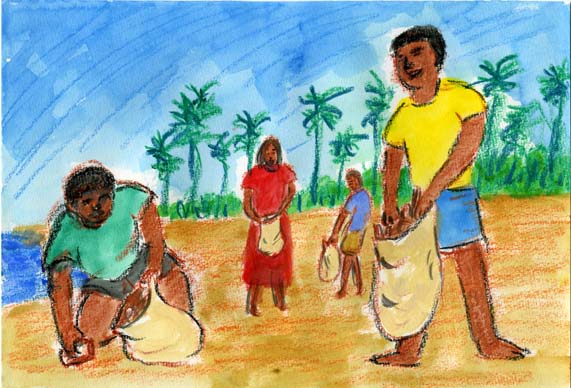 |
|
| 17. After that, Piita's eagerness made his friends work together. And they started to collect the garbage as much as possible, aluminum cans, steel cans, steel scraps and PET bottles. Then they made them into two groups. The one was recyclable, the other was not recyclable. Piita and his friends collected garbage everyday. All their spare time was spent on doing that. Then, the sea became beautiful very quickly. And the mountain of recyclable resources became higher and higher." Imwin anne ao raraon Piita a nora ingaingan nanona ao a bane ni buokia. Ao a rikorikoi m'ange ake a kona n rikoi n aron tiin aramanim, tiin ni biti, makoro ni biti ao batoro buraetitiki ni moi ran ao karevereve. Ao ngkanne a kakaokoroi m'ange akanne ba m'ange ake a kona ni manga kamanenaaki ao m'ange ake aki kona ni manga kamanenaaki. Ao anne tabeia Piita ma raoraona akekei ni katoa bong. Ao ngkana aki tabetabe ao a kabanea riki aia tai n rikoi ao ni ikoikoti m'ange. Ao akea ba e a itiaki man tamaroa taari n te tai ae rangi ni waekoa ao te m'ange are kona ni manga kabonganaaki e a tabukirake. |
|
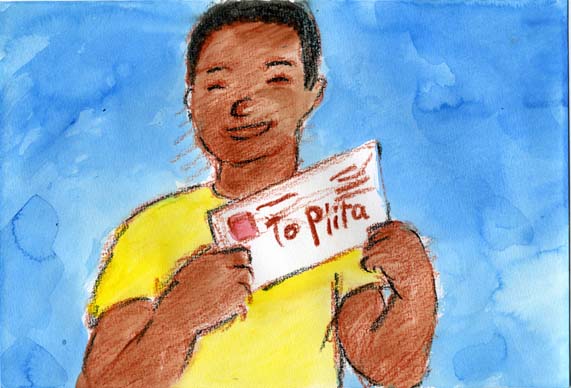 |
|
| 18. One day like that, Piita got a letter from a captain of the recycling boat. The recycling boats were owned by the protection team of global environment and they come around some islands and collect the recycled resources. Piita wanted the boat come to this island someday. So he was very glad and jumped up. N te bong teuana ao e a roko ana reta Piita mai iroun te kaben n te kaibuke tewaana are tabeakin m'ange ake a kona ni kaokiokaki kabonganaaia. Kaibuke ae aekan anne, bon ana kaibuke te Botaki are tabe ma te otabanin n te Aonnaba ao a kakawari aba tabeua n rikorikoi ti m'ange akana a manena akanne E tangiria Piita ba e na kawara naba abana te kaibuke anne n te tai teuana. Imwina ao ea rotaki n te kukurei ae bati ao e a kibakibarake. |
|
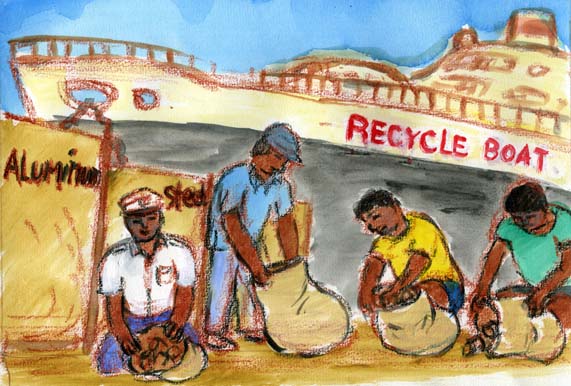 |
|
| 19. Because of the recycling boat's arriving, all over the island was like a festival. Piita and his friends packed the recycled resources they gathered in bags, and brought them to the recycling boat. When the inspector opened the collected bags, he gave a shout. Inspector: "Very bad ! They are not separated by the type of the garbage. We are sorry that we can not take back in this condition." Piita and his friends didn't know such a careful separation, so some garbage were in the same bags. Piita: "We will separate them again." When they started to do so, the captain came there. Captain: "Do you need my help ?" As the captain helped them, other crews also helped. Ngke a ongo ae nang roko te kaibuke arei ao te koraki a rotaki n te kukurei ae bati Ao ngke e a roko te kaibuke anne ao ko taku ba ai te botaki ae bubura are e a boo iaon te aba arei mai tabona nako tabona. Ao Piita ma raona akekei a baekini m'ange ake a na manga kamanenaaki ao a uotia nakon te kaibuke. Ma ngke e kauki baeki akekei te Tia Tutuo man te kaibuke ao e nanokawaki. Tia Tutuo: "E rangi ni buakaka! E bon aki kakaokoroaki te m'ange teuana ma teuana.n aekaia nako. I nanokawaki ba I aki kona n outi nakoi n arona aei." Pita ma raona akekei, a bon aki ata ae a na riai ni karauaki ni kakaokoroaki te m'ange teuana ni baekina teuana ao n tokina a nnei aekan m'ange aika bati n teaina te baeki. Piita: "E aoria ma ti na manga kakaokoroi riki m'ange aikai." Ao ngke a tabe ni karaoa anne, ao e a roko naba Kabenin te kaibuke arei. Kaben: "Kam na kainanoa au ibuobuoki?" Ao ngke buokiia te Kaben ao aki tabara kaimoa ni kanakoa naba aia ibuobuoki. |
|
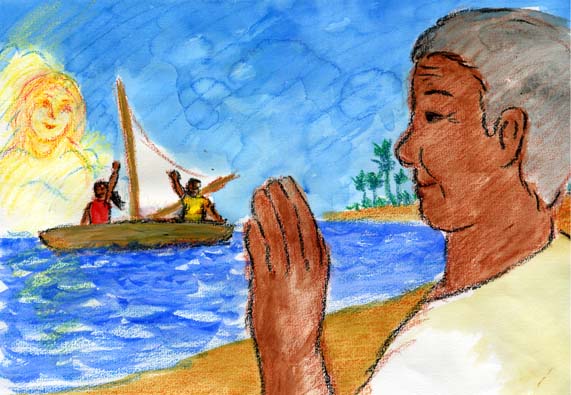 |
|
| 20. One year later, the sea became beautiful as before. There is no garbage left on the shoreline and beach, and the number of the fish were increasing. Grandpa Taom was recovered and waving his hand on the white beach as before. Piita was on the boat by wind and listening the voice of the sea. Then, he listened the voice of the goddess between waves. Goddess: "Thank you very much for beautiful sea, Piita." Piita nodded and said in a little voice, Piita: "Thank you very much, me too." Teuana te ririki imwina, ao e a itiaki ma n tamaroa taari n arona are rimoa. Akea te m'ange iaon te ora ao iaon te bike, ao e a rikirake ni maiti te ika. Ao tibuna are Taom e a rikirake ni marurung ao e katiotioi baina iaon te bike are e a bo taka mainainana n aekana are rimoa. E toka Piita n te booti ae ieie ao e kakauongo rurungaan taari ao bwanaan te Atua te aine ri buakon rurungaan taian nao. Goddess: "Ko rang ni bati n raba." E katoutoua atuna Piita ao e kauarerekea banana ni kangai; Piita: "Ko rang ni bati n raba, ngai naba." |
|
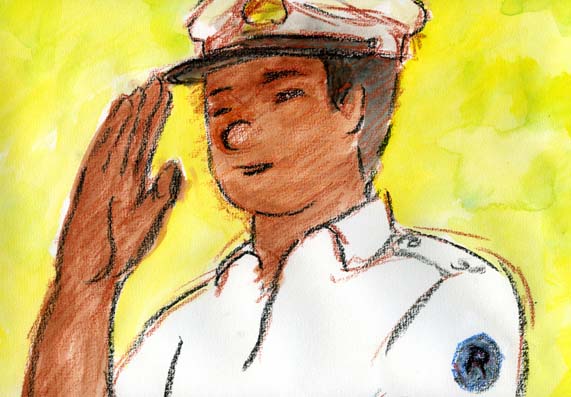 |
|
| 21. After that, Piita became the captain of the recycling boat and traveling around the sea to collect the recycle resources. Imwin anne ao e a riki Piita ba te kaben ngaia n te kaibuke ae mamananga ni katobibia te aonnaba n rikorikoi m'ange ake a manena ma ni kona ni manga kabonganaaki (re-cycled). |
|
|
The end of the story E A TOKI TE KARAKI |
|
|
¦Produced & Drawn by Yusaku Hino, ecology planner |
|
|
|
|
Copyright 2001-Christmas Island Clean Up Foundation